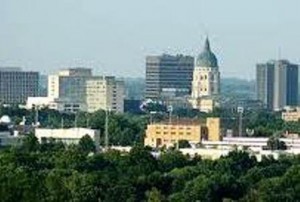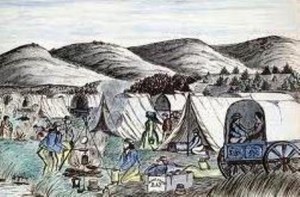Archive for June 5th, 2013
» posted on Wednesday, June 5th, 2013 by Linda Lou Burton
Digging Topeka
 Linda Burton posting from Topeka, Kansas – “It is novel, of Indian origin, and euphonious of sound.” Rev S Y Lum is purported to have said that about the word “Topeka” when he proposed it for the city’s name on January 1, 1855. He also claimed it was “a name not found in the list of post offices of the United States, nor in any lexicon of the English language.” Fry W Giles, one of the founders of Topeka, recorded that the founders liked the name – “since it is composed of three consonants
Linda Burton posting from Topeka, Kansas – “It is novel, of Indian origin, and euphonious of sound.” Rev S Y Lum is purported to have said that about the word “Topeka” when he proposed it for the city’s name on January 1, 1855. He also claimed it was “a name not found in the list of post offices of the United States, nor in any lexicon of the English language.” Fry W Giles, one of the founders of Topeka, recorded that the founders liked the name – “since it is composed of three consonants  alternating with three vowels, it is easy to pronounce.” It was adopted unanimously the next day. Topeka. I was in track-down mode, looking for the name origin of the city. Little did I suspect that potatoes would be part of the story I found. John Dunbar, a professor at Washburn University in the 1870’s, wrote that the name “Topeka” is composed of three words common in the languages of the Iowa, Omaha, and Kansa Indians; “to” means potato, “pe” means good, and “okae” means to dig. He believed that the word Topeka literally means “a good place to dig potatoes.” To dig potatoes? I had to dig deeper. Who originally used the name? Do potatoes really grow around here? I learned that Missionary Johnston
alternating with three vowels, it is easy to pronounce.” It was adopted unanimously the next day. Topeka. I was in track-down mode, looking for the name origin of the city. Little did I suspect that potatoes would be part of the story I found. John Dunbar, a professor at Washburn University in the 1870’s, wrote that the name “Topeka” is composed of three words common in the languages of the Iowa, Omaha, and Kansa Indians; “to” means potato, “pe” means good, and “okae” means to dig. He believed that the word Topeka literally means “a good place to dig potatoes.” To dig potatoes? I had to dig deeper. Who originally used the name? Do potatoes really grow around here? I learned that Missionary Johnston  Lykins drew a map in 1849 while living at the Potawatomi Baptist Mission and used the word “Topeka” as the name of the Smoky Hill fork of the Kansas River. His map was published in 1853; likely the city founders had seen it when they named Topeka in 1855. And I found much written about the “Psoralea esculenta” or prairie potato, by explorers and settlers crossing the Kansas River and heading west. Like John Fremont, who led multiple surveying expeditions through western territories. » read more
Lykins drew a map in 1849 while living at the Potawatomi Baptist Mission and used the word “Topeka” as the name of the Smoky Hill fork of the Kansas River. His map was published in 1853; likely the city founders had seen it when they named Topeka in 1855. And I found much written about the “Psoralea esculenta” or prairie potato, by explorers and settlers crossing the Kansas River and heading west. Like John Fremont, who led multiple surveying expeditions through western territories. » read more
